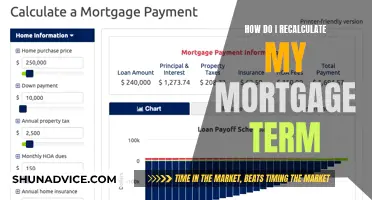
If you're considering reaffirming your mortgage after bankruptcy, it's important to understand the potential risks and benefits. Reaffirming your mortgage means signing a new agreement to be responsible for the debt, even if your bankruptcy would have otherwise discharged it. This can have serious consequences, and it's generally not recommended unless you've negotiated more favourable terms with your mortgage lender. While reaffirming may help you keep your home and improve your credit score, it also means that if you can't make payments, the lender can sue you for the remaining balance. Before making any decisions, it's crucial to seek advice from a bankruptcy attorney to understand your specific situation and options.
| Characteristics | Values |
|---|---|
| Reaffirming mortgage debt | Not required under the Bankruptcy Code |
| Requires a comprehensive multi-page reaffirmation agreement | |
| Reaffirmation agreement must be filed with the court | |
| Reaffirmation agreement must be signed by the bankruptcy attorney | |
| Reaffirmation agreement must be approved by a judge | |
| Reaffirming mortgage debt creates new debt | |
| Reaffirming mortgage debt may lead to losing the property | |
| Reaffirmation agreements are unnecessary | |
| Reaffirming mortgage debt may allow you to keep your home | |
| Reaffirming mortgage debt may improve your credit score | |
| Reaffirming mortgage debt may help rebuild your credit sooner | |
| Reaffirming mortgage debt may lead to being sued for money | |
| Reaffirming mortgage debt may have positive and negative consequences |
What You'll Learn

Pros and cons of reaffirming your mortgage
Reaffirming your mortgage after bankruptcy can have both positive and negative consequences. It is a complex process and only suitable for some. Before making a decision, it is important to understand the implications and seek legal advice. Here are some pros and cons to consider:
Pros of Reaffirming Your Mortgage:
- Keep Your Home: Reaffirming your mortgage allows you to keep your home and continue making payments. Without reaffirmation, lenders can still foreclose on your property if you don't make your payments.
- Improve Credit Score: Making timely mortgage payments after reaffirmation can help improve your credit score. Lenders typically stop reporting payments to credit agencies after bankruptcy, but reaffirming may lead to continued reporting of your on-time payments.
- Modified Loan Terms: In some cases, reaffirming your mortgage may lead to modified loan terms, such as a lower interest rate or lower monthly payments. This can make keeping your mortgage more beneficial and affordable.
Cons of Reaffirming Your Mortgage:
- New Debt Liability: When you reaffirm your mortgage, you assume liability for a debt that would otherwise be discharged in bankruptcy. This means you are responsible for paying the mortgage, even if your financial situation hasn't improved or the value of your home has decreased.
- Risk of Foreclosure: If you reaffirm and then cannot make your mortgage payments, you may lose your home to foreclosure. This is a significant risk, especially if you were already struggling financially and considering bankruptcy.
- Unnecessary Process: Reaffirmation agreements are generally unnecessary. You can keep your home and continue making payments without reaffirming. There is usually no tangible benefit to reaffirming unless the lender offers modified loan terms.
- Legal Complexity: Reaffirming your mortgage requires a comprehensive agreement filed with the court and signed by your bankruptcy attorney. Some attorneys may be reluctant to sign, and the process can be confusing and challenging.
Paying Off Your Mortgage Faster: Strategies for Success
You may want to see also

Reaffirmation agreements
However, there are also downsides to reaffirmation agreements. If you cannot make your mortgage payments after reaffirming the debt, you may lose your home to foreclosure. This can be especially risky if you are already struggling to make payments. Additionally, if you reaffirm the mortgage and can't make the payments, the mortgage company can and likely will sue you for money. They cannot sue you for money if you refuse to reaffirm.
Before signing a reaffirmation agreement, it is crucial to carefully weigh the pros and cons and seek the advice of a bankruptcy attorney. It is also important to understand the consequences of reaffirming your mortgage and consider whether you can afford the payments and if you want to keep the property in the long term.
Prepaying Your Mortgage: Strategies for Financial Freedom
You may want to see also

Chapter 7 bankruptcy
In the context of Chapter 7 bankruptcy, a mortgage is considered a secured debt, typically tied to an individual's home. Even though a mortgage is secured, it is still subject to discharge under Chapter 7. This means that if an individual files for Chapter 7 bankruptcy, they may no longer be personally responsible for paying the mortgage. However, it's important to note that the lien on the property is not eliminated, and the lender can still initiate foreclosure proceedings if payments are not made.
Reaffirmation agreements come into play when individuals want to retain their homes or other essential assets. These agreements are voluntary contracts between debtors and creditors, allowing debtors to reaffirm their commitment to repaying secured debts that would otherwise be discharged in the bankruptcy process. By signing a reaffirmation agreement, individuals agree to continue making payments under the original or modified loan terms. This effectively removes the debt from the bankruptcy discharge and keeps the debtor liable for the total amount.
When considering a reaffirmation agreement for a mortgage during Chapter 7 bankruptcy, it's crucial to weigh the advantages and disadvantages. On the positive side, reaffirming your mortgage may allow you to keep your home and improve your credit score by demonstrating financial responsibility through regular payments. However, there are significant risks involved. Reaffirmation agreements reestablish liability for debts, and if an individual cannot make the mortgage payments after reaffirming, they may lose their home to foreclosure. Additionally, debtors should be aware that reaffirmation agreements are not necessary to keep their homes. It is possible to continue making mortgage payments after bankruptcy and protect their homes from foreclosure without signing a reaffirmation agreement.
Before entering into a reaffirmation agreement, individuals should carefully assess their financial situation and ensure they can realistically afford the payments. It is recommended to seek the advice of a bankruptcy attorney to understand the potential consequences and explore alternative options. Judges ultimately decide whether to approve reaffirmation agreements, and their stance may vary depending on the state and the specific circumstances of the case.
Making Mortgage Payments: Wells Fargo Guide
You may want to see also

The role of bankruptcy lawyers
The decision to reaffirm a mortgage after bankruptcy is a complex and challenging process, and it is only suitable for some. It is a decision that should not be taken lightly and should be made with a clear understanding of its implications.
Bankruptcy lawyers play a crucial role in helping individuals navigate the complexities of reaffirmation and making informed decisions that align with their long-term financial goals. Consulting with an experienced bankruptcy attorney is essential to understanding the consequences of reaffirming a mortgage and exploring alternative options.
Bankruptcy attorneys guide individuals through the entire process, from negotiations with creditors to reviewing and signing the reaffirmation agreement. They ensure that their clients understand the legal effects and consequences of the agreement, including the risk of default. Some attorneys may refuse to sign the agreement if they believe it imposes an undue hardship on their client.
Additionally, bankruptcy lawyers can advise on the potential benefits of reaffirmation, such as the ability to retain important secured property and the possibility of improved loan terms through negotiation. They can also provide valuable insights into the reporting of on-time payments to credit bureaus, which can help rebuild credit.
In summary, the role of bankruptcy lawyers is to provide legal expertise, advise on the pros and cons of reaffirming a mortgage, and assist in the negotiation, drafting, and signing of reaffirmation agreements. They help individuals make informed decisions, ensuring that their clients' best interests are protected throughout the process.
Paying Off Your Chase Mortgage: Strategies for Success
You may want to see also

The consequences of not reaffirming
If you don't reaffirm your mortgage debt, your lender can repossess your property. However, they cannot pursue you for any money, even if there is a large deficiency. This is because Chapter 7 bankruptcy eliminates your personal liability on all dischargeable debts, including your mortgage. So, if you can no longer afford to keep your home, you can walk away without fear of a deficiency judgment.
If you don't reaffirm, your lender may still let you keep the property as long as you make timely payments on the loan. However, they can repossess your property at any time without a contract in place.
Another consequence of not reaffirming is that you will not be able to improve your credit score by reporting future on-time payments to credit reporting agencies. However, most lenders will stop reporting to these agencies once bankruptcy is filed, even if you continue to make monthly payments. So, the benefit of reaffirming your mortgage may be minimal in this regard.
Finally, if you don't reaffirm your mortgage debt, you will not create new debt. When you sign a reaffirmation agreement, you assume liability for a debt that would otherwise be eradicated in your bankruptcy.
A Guide to Understanding and Applying for a Mortgage
You may want to see also
Frequently asked questions
A mortgage reaffirmation is an agreement that confirms a person’s responsibility for paying off their debt, even after discharge of other debts.
If you don't reaffirm your mortgage, your lender can repossess your property. However, they cannot pursue you for the remaining balance.
If you reaffirm your mortgage, you will be personally liable for the debt. This means that if you are unable to make your payments, your lender can foreclose and pursue you for the remaining balance.
Reaffirming your mortgage may allow you to keep your home and improve your credit score by continuing to make payments.
Reaffirming your mortgage can be complex and challenging, and it may not be suitable for everyone. It can also lead to increased future risk and increased attorney fees.







